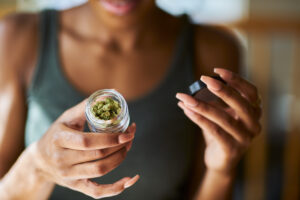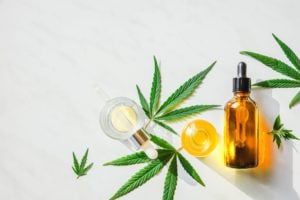Does Benadryl Make You Sleepy?
If you have ever taken Benadryl for hay fever, allergies, or a cold, you may have noticed that it also made you feel drowsy. The active ingredient in Benadryl, diphenhydramine, is an antihistamine also found in other common over-the-counter medications, such as Advil PM, Excedrin PM, and Motrin PM.
Diphenhydramine affects the body’s natural sleep-wake cycle, making it easier to fall asleep. Because of this effect, some people use Benadryl as a sleep aid. However, it can cause side effects that might make someone think twice about taking it to help them get to sleep.
Are You Getting Enough Deep Sleep?
A variety of issues can cause degrade your sleep quality. Answer three questions to understand if it’s a concern you should worry about.
Can Benadryl Help You Sleep?
Benadryl makes people sleepy because it blocks a molecule in the body called histamine. Histamine helps the body fight off germs, but it also causes the unpleasant swelling, itchiness, and runny nose associated with an allergic reaction. Histamine is also involved in keeping people awake during the day, so when Benadryl blocks the effect of histamine, it leads to sleepiness.
People often use Benadryl to help them fall asleep, as antihistamines can be effective and are easily available over the counter. However, doctors caution against overusing antihistamines like Benadryl for insomnia or other sleep issues, and they especially warn against its use by older adults .
What Are the Downsides to Using Benadryl for Sleep?
Even though Benadryl can help people fall asleep, it may not be the best choice of a sleep aid. Diphenhydramine can have side effects, including nervousness, dry nose, mouth, and throat, dizziness, headache, nausea, and loss of appetite.
In addition to these side effects, several other downsides of taking Benadryl are important to keep in mind.
- Reduced sleep quality: Benadryl may make people sleepy, but studies have not found evidence that it improves sleep quality. In fact, it may even decrease the quality of a person’s sleep.
- Loss of effectiveness: Research has shown that the more someone takes Benadryl to help them sleep, the less effective it becomes. One study even found that, after only four days of taking diphenhydramine for sleep, it became no more effective than a placebo .
- Daytime sleepiness: The drowsiness that Benadryl causes may help people fall asleep, but it also continues after they wake up the next day.
- Slowed reaction time: Benadryl can slow the brain’s responses, affecting motor skills and reaction time, which can persist into the following day .
Parents and guardians should not give Benadryl to school-aged and younger children without first talking to a doctor. In some cases, children who have taken Benadryl have experienced serious side effects.
Similarly, adults over the age of 65 should talk to their doctors before taking Benadryl for sleep. In older adults, Benadryl is more likely to cause side effects like dry mouth and eyes, trouble urinating, and confusion. It may also increase the risk of falling.

Other Ways to Get Quality Sleep
If you want to avoid the downsides of taking Benadryl for sleep, or your doctor has cautioned against it, other approaches may help you get better sleep.
Improve Your Sleep Hygiene
You can make many changes in your daily life that can improve your sleep hygiene and help you sleep better at night.
- Stay consistent: Go to bed and wake up at the same times every day, even on the weekends.
- Limit caffeine: Caffeine can continue to affect the body for up to eight hours. Limiting your caffeine use to the mornings can ensure that it is out of your system by bedtime.
- Exercise: Getting physical activity is a proven way to improve sleep. But avoid exercising within a few hours of bedtime.
- Avoid alcohol: Although alcohol might help you fall asleep, it can lead to poorer quality sleep overall.
- Dim the lights: Around an hour before bedtime, limit exposure to artificial lights, including your cell phone and TV.
Sleep Aids
A variety of sleep aids are available both over the counter and by prescription. Although doctors typically recommend starting with lifestyle changes for sleep issues, sleep aids may be helpful when combined with better sleep hygiene. If you are considering using sleep aids to fall asleep, your doctor can help find the right one for you.
When to See a Doctor
If you consistently find it hard to fall asleep or if a lack of sleep starts to affect your daily activities, talk to your doctor. A doctor can assess your sleep issues and help determine what might be causing them.
References
5 Sources
-
Neubauer, D. N. (2022, December 19). Pharmacotherapy for insomnia in adults. In R. Benca & J. G. Elmore (Eds.). UpToDate., Retrieved March 27, 2023, from
https://www.uptodate.com/contents/pharmacotherapy-for-insomnia-in-adults -
Ozdemir, P. G., Karadag, A. S., Selvi, Y., Boysan, M., Bilgili, S. G., Aydin, A., & Onder, S. (2014). Assessment of the effects of antihistamine drugs on mood, sleep quality, sleepiness, and dream anxiety. International Journal of Psychiatry in Clinical Practice, 18(3), 161–168.
https://pubmed.ncbi.nlm.nih.gov/24673474/ -
Richardson, G. S., Roehrs, T. A., Rosenthal, L., Koshorek, G., & Roth, T. (2002). Tolerance to daytime sedative effects of H1 antihistamines. Journal of Clinical Psychopharmacology, 22(5), 511–515.
https://pubmed.ncbi.nlm.nih.gov/12352276/ -
Culpepper, L., & Wingertzahn, M. A. (2015). Over-the-Counter Agents for the Treatment of Occasional Disturbed Sleep or Transient Insomnia: A Systematic Review of Efficacy and Safety. The primary care companion for CNS disorders, 17(6), 10.4088/PCC.15r01798.
https://pubmed.ncbi.nlm.nih.gov/27057416/ -
DeShazo, R. D., & Kemp, S. F. (2022. August 17). Pharmacotherapy of allergic rhinitis. In J. Corren (Ed.). UpToDate., Retrieved March 27, 2023, from
https://www.uptodate.com/contents/pharmacotherapy-of-allergic-rhinitis










